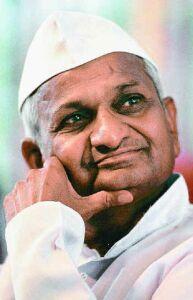In my previous post, I spoke about how corrupt governments and conflicts seriously dampen a countries quest to economic development and poverty eradication. While these posts were very general, today I would like to provide you with specific examples from across the world to show you what I mean.
Lets begin with India. One third of the world’s poor find themselves facing rising food prices, living with their large numbered families in small huts, paying large amounts of money to corrupt landlords and politicians, and in return not getting the livelihood they deserve. Unfortunately, a transparent government does not exist. A transparent government would prevent corruption, show the people what exactly their funds are being used for and provide a check against greedy politicians. Over the past three days, almost the entire Indian population has turned its attention to social activist Anna Hazare’s fast
against corruption. The new Lokpal Bill proposed by the government would provide stricter anti-corruption laws, but Hazare has proposed an even stricter bill to be formatted. Indians all over the country have joined the protests showing just how angered they are by the corruption in the government. Transparency is key to international economic development, and a corrupt government, as I mentioned in my previous post, is one of the forefront causes that hampers development.
The revolutions in the Middle East in Tunisia, Egypt and Libya are great examples of how the people of those countries have been unhappy with their governments. Rising unemployment, poverty and lack of education in these countries caused the people to finally get fed up with their corrupt governments. They finally realized that in order for their country to move forward both economically and socially, a transparent democratically elected government was necessary. Moreover, the experience of countries like Rwanda, Mozambique and Liberia has demonstrated that peace and recovery are possible even after decades of the dictatorship or debilitating conflict.
With more and more governments being scrutinized, it becomes clear what an important role they play in economic development. While conflicts play an equally important role, they result from external factors not in the control of a country’s government or people. The conclusion is that a clean government leads to a bright future. A country has no hope if billions of dollars are going into the wrong pockets.
Udit Hinduja is a student at New York University double majoring in Economics and Political Science. As a Program and Research intern with the SISGI Group his focus areas are education, poverty and economic development in Asia and South America.


